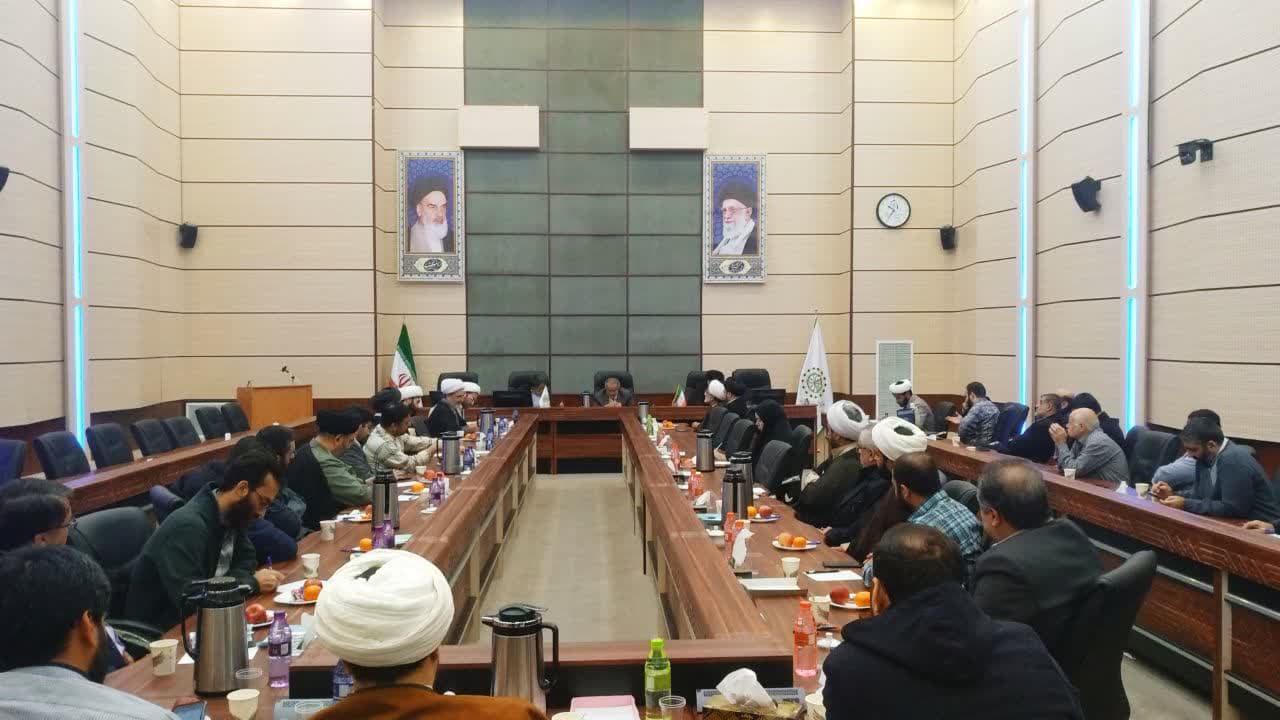Iran, Yemen have common civilization: Musawi Nejad
The seminar “The role of ulama and religious intellectuals in the awakening and resistance movement of the Yemeni people” was held at conference hall of the AhlulBayt (a.s.) World Assembly, participating seminary and university professors.
ABWA Official Website – The seminar “The role of ulama and religious intellectuals in the awakening and resistance movement of the Yemeni people” was held on Tuesday morning, December 6, 2022, at conference hall of the AhlulBayt (a.s.) World Assembly, participating seminary and university professors.
The secretary of the seminar was Hojat al-Islam Dr. Sayed Ebrahim Masoumi, the director of the Regional Studies Department of the AhlulBayt (a.s.) World Assembly, and Dr. Ali Musawi Nejad, a faculty member of the University of Islamic Religions and Denominations, as well as Dr. Essam Al-Emad, a professor at the Al-Mustafa (p.b.u.h) International University presented their views in the seminar.

We have not enough knowledge about Yemen: Musawi Nejad
In the first part of this meeting, pointing to knowledge as the path of excellence in the present era, Dr. Musawi Nejad stated, “Knowing this, the enemy is always ahead of us, and we are a few steps behind them. For example, Shiites in Iran do not know much about the people of Yemen, and the enemy uses this gap to inflame the fire of discords.”
“The most important reason for the desolation of Yemen is the geographical and regional conditions of the country in history. Because although the mountainous and inaccessible areas are important from a strategic and military aspects, they have prevented effective communication with the Yemeni people,” he added.
“From the time of its emergence until the beginning of the Occultation Era (of Imam Mahdi), Zaidiyyah has been establishing its position as an independent thought. The biggest differences between them and Twelver Imami Shiites are related to these issues. But after this time passed, these two thoughts always moved towards convergence,” emphasized the professor at the University of Islamic Religions and Denominations.
“In their time, the Imams (a.s.) always sought to reduce differences with the Zaidiyyah and cared about them. On the other hand, the Zaidiyyah considered them the Imams of knowledge and ijtihad. But the differences were natural in that historical period and according to those conditions. As mutual understanding increased over time, historical differences gradually disappeared, and these two thoughts are closer together than before,” Musawi Nejad further said.
“In the past, some Zaidi ulama disrespected Shiite Imams because of their observing Taqiyah (ostensible denial of religious belief). Now the enemy is exaggerating these kinds of things. But Zaidiyyah does not accept the works of their previous ulama in any way,” he added.
“The common culture of Iran and Yemen rooted in the common history and civilization of the two countries. So that some Yemeni people are of Iranian descent before Islam, who migrated to Yemen from the northern regions of Iran. Also, the people and even the ulama of Yemen are very interested in the Islamic Republic of Iran and seek to communicate with the Shiites of Iran,” said the professor at the University of Religions and Denominations.
“The main Zaidi branches were Shiite from the beginning, and their thinking was also close to the Twelver Shia. But they had differences regarding the continuation of the Imamate of AhlulBayt (a.s.). In the meantime, deviant branches have been emerged in Zaidiyyah, whose opinions should not be considered as the intellectual foundations of Zaidiyyah, and they are not a symbol of this thought in any way,” Musawi Nejad said, concluding his lecture.
Iran’s Islamic Revolution was like oxygen for Yemen: Al-Emad
Further in the conference, presenting his lecture, Dr. Essam El-Emad, professor at Al-Mustafa (p.b.u.h) International University on the reason for the flourishing of the Zaidiyyah stated, “Martyr Hussain Al-Houthi, was a great scholar of Zaidiyyah who caused a transformation in this thought, just as the Islamic world flourished after Imam Khomeini (r.a.). After this big event, some members of the society rose up to oppose him, so that twenty of Zaidi ulama issued fatwa to kill Hussain Al-Houthi.”
“Sayed Hussain Al-Houthi had great respect for Imam Khomeini (r.a.), and always tried to promote and teach his jurisprudential and theological principles. Al-Houthi believed, “I have not seen a person who understands the Quran like Imam Khomeini (r.a.)”,” he further added.
“The resistance of the Yemeni people was the result of spreading the thoughts of Imam Khomeini (r.a.), and the Iranian Islamic Revolution acted as oxygen that the Yemeni people inhaled, and it is not stoppable,” said the professor at Al-Mustafa (p.b.u.h) International University.
“After the dissolution of the Mu’tazila, all their books were brought to Yemen, and the Zaydi ulama, under the influence of those principles, started enmity with the Twelver Shiites. Because throughout history, Mu’tazila has always opposed Shia. Al-Qasim al-Rassi was one of the Zaydi ulama who, emulating the Mu’tazila, considered Shiites as Rafidi,” Al-Emad said about the history of Zaidiyyah.
“Yemeni Ansarullah movement can be considered a moderated traditional Zaidiyyah, which is closer to Twelver Shiite than before. This is due to the efforts of Sayed Hussain Al-Houthi, who tried to remove the Mu’tazila thoughts from Zaidiyyah and return Zaidiyya to its roots,” he added.
“In the Yemeni War, the Saudi attack are more on the areas where Ansarullah is located, unlike the areas where there is traditional Zaidiyyeh. Because Saudi Wahhabism considers its thought close to traditional Zaidiyyeh, and they, due to their prejudices, try to avoid Ansarullah thought, which is close to Twelver Shia,” said professor at the Al-Mustafa (p.b.u.h) International University, concluding his lecture. /345/
The seminar “The role of ulama and religious intellectuals in the awakening and resistance movement of the Yemeni people” was held at conference hall of the AhlulBayt (a.s.) World Assembly, participating seminary and university professors.
ABWA Official Website – The seminar “The role of ulama and religious intellectuals in the awakening and resistance movement of the Yemeni people” was held on Tuesday morning, December 6, 2022, at conference hall of the AhlulBayt (a.s.) World Assembly, participating seminary and university professors.
The secretary of the seminar was Hojat al-Islam Dr. Sayed Ebrahim Masoumi, the director of the Regional Studies Department of the AhlulBayt (a.s.) World Assembly, and Dr. Ali Musawi Nejad, a faculty member of the University of Islamic Religions and Denominations, as well as Dr. Essam Al-Emad, a professor at the Al-Mustafa (p.b.u.h) International University presented their views in the seminar.

We have not enough knowledge about Yemen: Musawi Nejad
In the first part of this meeting, pointing to knowledge as the path of excellence in the present era, Dr. Musawi Nejad stated, “Knowing this, the enemy is always ahead of us, and we are a few steps behind them. For example, Shiites in Iran do not know much about the people of Yemen, and the enemy uses this gap to inflame the fire of discords.”
“The most important reason for the desolation of Yemen is the geographical and regional conditions of the country in history. Because although the mountainous and inaccessible areas are important from a strategic and military aspects, they have prevented effective communication with the Yemeni people,” he added.
“From the time of its emergence until the beginning of the Occultation Era (of Imam Mahdi), Zaidiyyah has been establishing its position as an independent thought. The biggest differences between them and Twelver Imami Shiites are related to these issues. But after this time passed, these two thoughts always moved towards convergence,” emphasized the professor at the University of Islamic Religions and Denominations.
“In their time, the Imams (a.s.) always sought to reduce differences with the Zaidiyyah and cared about them. On the other hand, the Zaidiyyah considered them the Imams of knowledge and ijtihad. But the differences were natural in that historical period and according to those conditions. As mutual understanding increased over time, historical differences gradually disappeared, and these two thoughts are closer together than before,” Musawi Nejad further said.
“In the past, some Zaidi ulama disrespected Shiite Imams because of their observing Taqiyah (ostensible denial of religious belief). Now the enemy is exaggerating these kinds of things. But Zaidiyyah does not accept the works of their previous ulama in any way,” he added.
“The common culture of Iran and Yemen rooted in the common history and civilization of the two countries. So that some Yemeni people are of Iranian descent before Islam, who migrated to Yemen from the northern regions of Iran. Also, the people and even the ulama of Yemen are very interested in the Islamic Republic of Iran and seek to communicate with the Shiites of Iran,” said the professor at the University of Religions and Denominations.
“The main Zaidi branches were Shiite from the beginning, and their thinking was also close to the Twelver Shia. But they had differences regarding the continuation of the Imamate of AhlulBayt (a.s.). In the meantime, deviant branches have been emerged in Zaidiyyah, whose opinions should not be considered as the intellectual foundations of Zaidiyyah, and they are not a symbol of this thought in any way,” Musawi Nejad said, concluding his lecture.
Iran’s Islamic Revolution was like oxygen for Yemen: Al-Emad
Further in the conference, presenting his lecture, Dr. Essam El-Emad, professor at Al-Mustafa (p.b.u.h) International University on the reason for the flourishing of the Zaidiyyah stated, “Martyr Hussain Al-Houthi, was a great scholar of Zaidiyyah who caused a transformation in this thought, just as the Islamic world flourished after Imam Khomeini (r.a.). After this big event, some members of the society rose up to oppose him, so that twenty of Zaidi ulama issued fatwa to kill Hussain Al-Houthi.”
“Sayed Hussain Al-Houthi had great respect for Imam Khomeini (r.a.), and always tried to promote and teach his jurisprudential and theological principles. Al-Houthi believed, “I have not seen a person who understands the Quran like Imam Khomeini (r.a.)”,” he further added.
“The resistance of the Yemeni people was the result of spreading the thoughts of Imam Khomeini (r.a.), and the Iranian Islamic Revolution acted as oxygen that the Yemeni people inhaled, and it is not stoppable,” said the professor at Al-Mustafa (p.b.u.h) International University.
“After the dissolution of the Mu’tazila, all their books were brought to Yemen, and the Zaydi ulama, under the influence of those principles, started enmity with the Twelver Shiites. Because throughout history, Mu’tazila has always opposed Shia. Al-Qasim al-Rassi was one of the Zaydi ulama who, emulating the Mu’tazila, considered Shiites as Rafidi,” Al-Emad said about the history of Zaidiyyah.
“Yemeni Ansarullah movement can be considered a moderated traditional Zaidiyyah, which is closer to Twelver Shiite than before. This is due to the efforts of Sayed Hussain Al-Houthi, who tried to remove the Mu’tazila thoughts from Zaidiyyah and return Zaidiyya to its roots,” he added.
“In the Yemeni War, the Saudi attack are more on the areas where Ansarullah is located, unlike the areas where there is traditional Zaidiyyeh. Because Saudi Wahhabism considers its thought close to traditional Zaidiyyeh, and they, due to their prejudices, try to avoid Ansarullah thought, which is close to Twelver Shia,” said professor at the Al-Mustafa (p.b.u.h) International University, concluding his lecture. /345/





